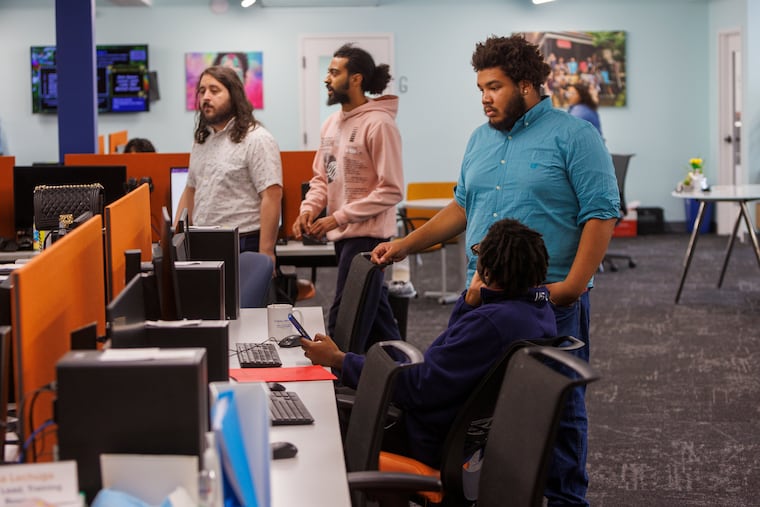Camden nonprofit uses AI tools like ChatGPT to help young people prepare for jobs
At Hopeworks, young workers learn how to find their own answers on the job. Generative AI like ChatGPT is just another way of doing that, the organization's leaders and trainees say.

On a typical Thursday morning, Hopeworks’ Camden headquarters is buzzing with teens and twentysomethings exploring technology that isn’t just new to them, but relatively novel to anyone. Their training and work often involves applications enhanced by artificial intelligence.
AI anxiety — as some have come to call it — is nowhere to be found.
Kai Jefferson, 26, used ChatGPT to brainstorm copy for her personal website. She tweaked the language “to make it sound more like me.”
Ramon Fernandez, 18, worked with the AI function in free online photo editing software Pixlr to create logos to use on a website. “It’s not always the best, but some are good,” he said.
William Bell, 21, said AI has been helpful in learning how to code by answering his basic questions quickly. “It explains certain lines of code in a way Google and other sites don’t,” he said.
Hopeworks, which has facilities in Camden and Kensington, aims to train young people for well-paid jobs. The only requirement is age — they must be at least 17 — and more than 94% of trainees are Black, brown, and Latinx, according to Hopeworks.
The organization pays trainees to learn new skills in areas such as web development, Geographic Information Systems, and data visualization. After they finish training, which includes job readiness instruction as well, they can choose an internship and their pay increases. Hopeworks then partners with employers in the region to help its participants find jobs.
In recent months, leaders at Hopeworks have begun experimenting with different ways to use AI to help trainees improve their employment prospects, said Erich Smith, director of learning and development.
“We think folks are getting AI exactly wrong,” CEO Dan Rhoton said. He says the technology is already “removing barriers erected by privilege.”
In the past year, 113 Hopeworks-trained young adults have gotten permanent jobs, the organization said, and their average annual salary when they get hired is over $40,000.
In addition to learning specific job-related AI uses, they’re trying it out for career development purposes, such as helping trainees write their cover letters and resumes using ChatGPT.
Often job applicants who don’t have professional experience — like many of Hopeworks’ trainees — are capable of a job but get eliminated from candidate pools because their application materials don’t match professional norms, Rhoton said. AI tools could help with that.
‘AI doesn’t get irritated’
Nearly four in 10 U.S. workers are worried about AI taking over some or all of their job duties, the American Psychological Association reported last month after completing its 2023 Work in America survey. These worries were more pronounced among workers with a high school education or less, and among nonwhite workers, the survey found.
Despite those concerns, experts seem to think AI is a long way off from replacing humans in the workplace.
Embracing the technology meshes with Hopeworks’ culture, Smith said. The organization’s curriculum is updated quarterly to match what employers are looking for. Staff learn new skills continuously, “modeling” lifelong learning for the trainees and interns, he said.
And the Hopeworks model emphasizes learning to find an answer independently — something tech-savvy young workers feel empowered to do with help from a tool such as ChatGPT.
“On the job, finding the answer yourself might be the only option instead of going to a supervisor,” Smith said.
Asking an AI basic questions might save young professionals time or help them prioritize their tasks. It could allow them to avoid awkward feelings or microaggressions early in their workplace experience, Rhoton said.
“AI doesn’t get irritated” by those inquiries, he said.
For the young people building skills at Hopeworks, rattling off ways they could use AI was easy.
“ChatGPT is a really welcome program for us,” said Bell, helping new coders avoid common errors.
Tajon Anderson, 19, started training at Hopeworks in Camden this month. On day four he worked on a training module in Pixlr, and Fernandez showed him how to browse images created by artificial intelligence to add to his project.
Anderson said his passion for coding goes back to ninth grade, when he took a class at his school. His high school didn’t offer additional coding classes, so he set his sights on getting that training later. The growth of generative AI in the years between hasn’t weakened his career hopes.
“It should be extraordinary as time goes on,” Anderson said. “AI should get better and better. I’m excited to see.”